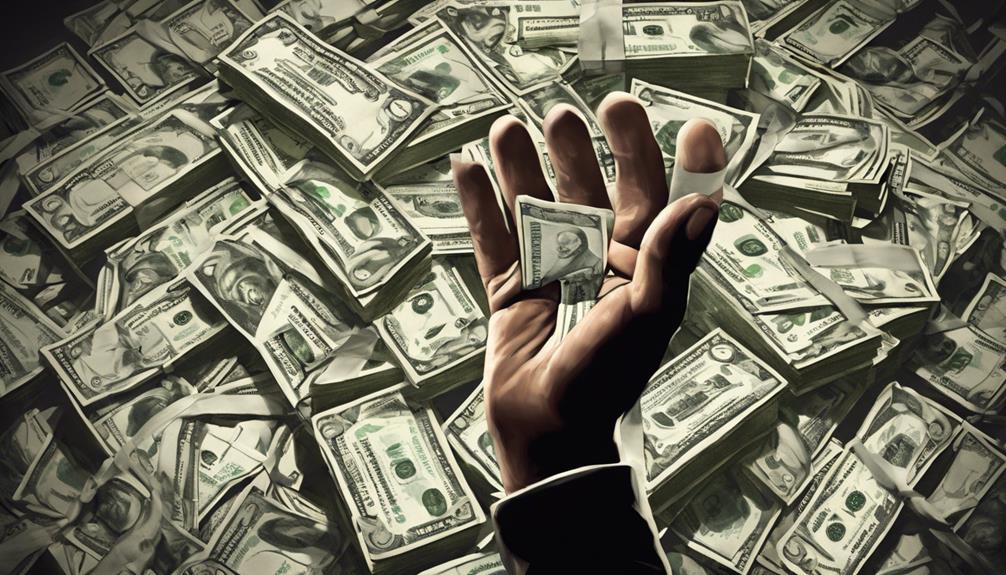Have you ever considered the ways in which narcissists use money as a powerful tool in their manipulative strategies?
The intricate ways in which they utilize financial control to dominate and coerce others can be both alarming and eye-opening.
Understanding the depth of this manipulation can shed light on the complexities of narcissistic behavior and its profound impact on individuals' lives.
Key Takeaways
- Narcissists exploit financial dependence to trap victims in abusive cycles of control.
- Impulsive spending serves as a manipulation tool to enforce compliance and dependency.
- Emotional blackmail through money coerces victims into prioritizing narcissists' demands.
- Financial control tactics erode autonomy, perpetuating toxic power imbalances in relationships.
Financial Control Tactics of Narcissists
Narcissists frequently employ sophisticated financial control tactics to assert dominance and manipulate their victims, often by closely managing all monetary decisions and limiting access to funds. These financially abusive narcissists use money as a tool to maintain power and control within relationships. By controlling the money, they create a dynamic where the victim is reliant on them for even the most basic financial needs, fostering a sense of helplessness and dependence. Covert narcissists, in particular, excel at concealing their manipulation behind a facade of normalcy, making it challenging for victims to recognize the extent of their financial abuse.
Victims of narcissistic financial abuse often find themselves in a precarious position, with their autonomy stripped away and their financial well-being at risk. The manipulation tactics employed by these individuals can range from subtle yet effective methods such as withholding money or pressuring for financial dependence, to more overt actions like dictating spending habits and restricting access to funds. Understanding these control mechanisms is essential in breaking free from the cycle of abuse and regaining financial independence.
Impulsive Spending as Manipulation Tool

In the domain of financial control tactics employed by manipulative individuals, impulsive spending emerges as a deceptive tool used to exert influence and solidify power dynamics within relationships. Narcissists utilize reckless spending as a means to manipulate and control others, creating a facade of generosity and superiority while ensnaring their victims in a web of dependency. This insidious tactic often involves extravagant spending sprees, frequently funded through credit cards, to showcase wealth and power, ultimately trapping individuals in a cycle of indebtedness and compliance.
- Narcissists use impulsive spending to manipulate others by creating a false sense of generosity and control.
- Impulsive spending allows narcissists to showcase their wealth and power while trapping victims in a cycle of dependency.
- Victims may feel indebted and compliant due to the lavish gifts and spending by narcissists, fostering a sense of control.
- Impulsive spending by narcissists can mask their true intentions of manipulation and control over their victims.
Emotional Blackmail Through Financial Means

Emotional manipulation through financial means involves the strategic use of money to coerce and control individuals in a relationship. Narcissists adept at financial manipulation may employ emotional blackmail tactics, leveraging spending money and credit as tools to maintain dominance and influence over their victims.
By linking financial support to compliance with their wishes, narcissists create a dynamic where victims feel compelled to conform out of fear of losing financial stability or facing repercussions. This form of manipulation can manifest through threats, coercion, and guilt-tripping, leading individuals to prioritize the narcissist's demands over their own well-being.
The resulting financial dependencies further entrench the power dynamics, making it challenging for victims to break free from the cycle of emotional blackmail. Over time, this insidious behavior can inflict lasting emotional and psychological harm, eroding the victim's sense of autonomy and self-worth.
Understanding the mechanisms behind emotional blackmail through financial means is essential in recognizing and combating such toxic dynamics.
Exploiting Financial Dependence for Control

Exploiting financial dependence for control reveals the insidious tactics employed by individuals seeking to maintain power and influence within relationships. When narcissists use money to manipulate through financial dependence, they create a dynamic where the victim's autonomy is eroded, leaving them vulnerable to manipulation and control. This manipulation is often deeply ingrained in narcissistic abuse, perpetuating a cycle of dominance and submission.
Victims may experience a sense of entrapment in abusive relationships due to their reliance on the narcissist for financial support.
Controlling the resources and finances of the victim is a common strategy employed by narcissists to maintain power and control.
Withholding money or using financial means to pressure the victim into dependence serves as a tool for manipulation and coercion.
Financial abuse by narcissists can manifest in various forms, all aimed at solidifying control and dominance over the victim.
Using Money to Undermine Independence

Utilizing financial leverage, narcissists strategically employ money as a tool to diminish their victims' autonomy and perpetuate a cycle of dependence and control within relationships. By wielding their material wealth and control over financial resources such as credit cards, narcissists manipulate their victims into a state of reliance, eroding their ability to make independent decisions. This lack of financial autonomy not only reinforces the power imbalance within the relationship but also serves as a means for the narcissist to exert dominance and restrict the victim's freedom.
In a relationship with a narcissist, the manipulation of money can extend beyond mere financial control; it becomes a method through which the narcissist asserts power over their victims, further entrenching them in a web of dependency. This insidious tactic, coupled with the narcissist's lack of empathy, traps the victim in a cycle of emotional distress and subjugation, making it challenging to break free from the toxic dynamics orchestrated by the narcissist. Recognizing and understanding how narcissists employ money to undermine independence is imperative for victims seeking to untangle themselves from the manipulative grasp of such individuals.
Conclusion
To sum up, the insidious tactics employed by narcissists to manipulate through money can have devastating consequences on victims' financial well-being and emotional health.
According to a study by the National Coalition Against Domestic Violence, financial abuse occurs in 99% of domestic violence cases. This statistic sheds light on the pervasive nature of financial manipulation and the urgent need for awareness and support for those affected.











